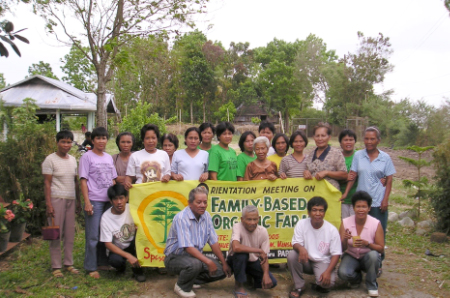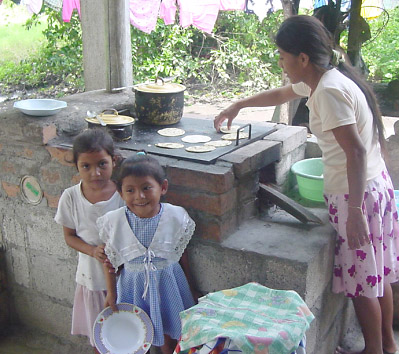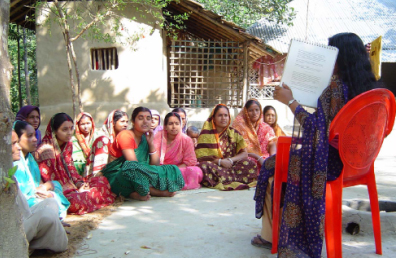
Volume 12, No. 1 Archives
Table Of Contents
Cottonwood awards $49,000 in grants in 2005
Cottonwood Partners Program to continue in 2006–2007
What is Cottonwood Foundation?
Give your support to Cottonwood Foundation!
In their own words
Cottonwood awards $49,000 in grants in 2005
Thanks to your support, this fall Cottonwood Foundation has awarded 23 grants of $1,000 each to grassroots organizations worldwide that are working for a sustainable future.
This brings the total grants awarded in 2005 by Cottonwood Foundation to $49,000, a new record! Cottonwood Foundation’s board has worked hard to select projects suggested by Cottonwood Partner organizations for which your contributions will make a significant difference.
Following is a listing of the 23 $1,000 grants awarded this past fall.
(Please note that organizations followed by "USA/[another country]" are
based in the United States, but were funded for a specific project in
another country.)
- African Blackwood Conservation Project, USA/Tanzania – to
double capacity of a tree nursery in Tanzania, allowing for an additional
50,000 seedlings of the overharvested African blackwood tree (mpingo)
to be produced every 18 months for replanting in the Kilimanjaro/Moshi
area.
- Association "Green Alternative", Republic Of Georgia – for
a "rent-a-tree" program in which physically disabled children
will handcraft 100 clay pots to be planted with native fir-tree saplings
and "rented" to families during the holiday season as an
alternative to using often illegally-cut trees, with the saplings to
be replanted in landslide areas afterwards, also including public outreach
on the negative impacts of illegal logging.
- Blue Veins, Pakistan – to build 6 publicly-accessible
toilets in Manki Village, Northwest Frontier Province where toilets
are currently not available, accompanied by community education on
sanitation, which will reduce current problems of disease, lack of
privacy, and environmental degradation.
- Center for People's Agricultural Plan for the 21st Century,
Philippines - to construct a deep-well water irrigation
system serving 10 organic family farmers in the village of Siason,
town of Murcia, province of Negros Occidental, which will allow the
farmers to grow food crops throughout the year and provide potable
water, as well as for purchase of vegetable seeds, farm equipment,
and training on composting.

The Center for People’s Agricultural Plan for the 21st Century in the Philippines will construct a deep-well irrigation system with Cottonwood funds to serve 10 organic family farms.
- Centre for Indian Knowledge Systems, India - to
help construct 10 grain storage structures in ten villages in Kancheepuram
District of Tamil Nadu where farmers are growing indigenous rice varieties
organically, which will help farmers store seeds safely from pests
and rodents, allow sufficient storage time before processing, and increase
the price the farmers receive for their grain.
- Centro de Educación Creativa, Costa Rica – for
purchase of tools, equipment, and materials to expand this environmental
school's reforestation program to 1,500 seedlings annually, which will
extend a local biological corridor, increase green space and attract
local species of insects and birds, and teach students and community
members about the natural world.
- Comite de Emergencia Garifuna de Honduras, Honduras -
to strengthen and expand work to replant balaire- a formerly common
but now threatened plant with cultural importance to the Garifuna -
in Iriona and Guadalupe villages, and to work with youth to reforest
with yagua, a traditional wood-like palm, including establishing tree
nurseries in the Garifuna towns of Santa Rosa de Aquan and Barra de
Aguan.
- Common Ground Program, Kenya – to empower
members of the Bafubi Women Group in Matunda village to address chronic
hunger by carrying out biointensive mini-farming and agroforestry,
purchase of tools and seeds, starting a tree nursery in the community
to grow 10,000 seedlings, and building a water tank to harvest roof
runoff at a local school with gray water to be recycled for gardening.
- Cultural Survival, USA/Mongolia – for a project
to assist Mongolia's nomadic herding Dukha people, including purchasing
veterinary medicines to treat 600 Dukha reindeer against parasites
and diseases, 20 carving tool kits for turning renewable reindeer antlers
into crafts, 25 Tyvan language books for indigenous school children,
and transportation costs for indigenous veterinarians.
- Dos Pueblos: New York - Tipitapa Sister City Project, USA/Nicaragua – for
purchase of equipment and related expenses to provide potable water
to at least 50 families in the barrio of el parte este of San Benito
Agricola, Tipitapa, Nicaragua which is currently without access to
any water, with heavy involvement of local volunteer labor.
- Global Children, USA/Cambodia – to help support
a visual art program at the Kampong Cham Orphanage in Cambodia, home
to about 65 orphans, that provides children with a better understanding
of Khmer culture, identity and history through artistic endeavors,
increases self-esteem and creativity, as well as providing young people
with a skill that can open opportunities for them to earn an income.
- Green India Foundation, India – to provide
financial and technical assistance to 20 women who had lost their livelihoods
after the 2004 Tsunami, which will allow them to each re-start their
own market fish sales businesses, including enough capital for each
woman to purchase an ice box and about 20 kilograms of fish for resale,
leading to potential earnings of $160 per month.
- Haiti Outreach, USA/Haiti – to help support
well drilling projects in two small communities outside of Mombin Crochu,
in Haiti’s northern plateau, which will provide clean water to
approximately 500 people per well, and where people currently need
to walk one mile to town with 5 gallon buckets on their heads for water
for their daily drinking, cooking, bathing and cleaning needs.
- Interaccion para el Desarrollo Sostenible, Bolivia –
to support reforestation activities in the rural, indigenous communities
of Sorata, San Pedro, Poquerani and Cirini through purchase of fruit
tree and agroforestry seeds, to be accompanied by training courses
presented in cooperation with local university student volunteers
on the topics of sustainable tourism and the environment, agroforestry,
and erosion control.
- Jeevan Rekha Parishad, India – to set up a
20,000 liter capacity rainwater harvesting system that will provide
drinking water and toilet facilities for 250 students and 3 teachers
in Gandharubaru village school, Kalahandi district, Orissa State, which
is located in a drought-prone area and currently has no source of water,
as well as to conduct an educational campaign about rainwater systems
for local communities.
- Los Cimientos Alliance, USA/Guatemala – to
help construct a security fence for the first phase of an environmental
education center serving the Maya K'iche community of Los Cimientos
which will provide a model for sustainable environmental development
and affordable housing, along with protection and reforestation of
an endangered land site near Lake Atitlan.
- Nabichakha Women Group, Kenya – to help reverse
deforestation in Kenya through ecologically-integrated self-help development
initiatives that will increase indigenous forest cover while also having
an economic application, including establishing tree nurseries, purchase
of indigenous tree seeds, planting trees in livestock grazing paddocks,
planting trees for fruit and fuel, and implementing other agroforestry
practices.
- Nepal Social Service Fund, USA/Nepal – to
help pay for rent, utilities and kerosene for a "Safe House" in
Kathmandu that serves as a homeless shelter for women and children,
a home-away-from-home for surgical patients from rural areas who are
in the city for medical care, an assistance provider for street children,
and a community education center for health education and literacy.
- Outreach Asia, USA/Philippines – to help construct
a 2-door restroom and a clean water drinking system at the Tomas Oppus
Central School in South Leyte, Philippines, serving 380 preschoolers
and students in grades 1 – 6, which currently has no toilet facilities,
and which will also be available for community use on weekends.
- Porters' Progress, USA/Nepal – to continue
daily education and empowerment programs offered free to working porters
in Lukla, Nepal, estimated to serve at least 6,000 porters this year,
including giving at least 500 English lessons, with funds used for
part-time salary of a class facilitator, teaching materials and supplies,
and a portion of office rent.
- Trees for the Future, USA/Philippines – to
purchase the harvest of five seed orchards, offering part-time employment
to 16 families, that will produce an estimated 420,000 seeds of fast-growing
trees to be planted by interested families in Zambales and Antique
Provinces in the Philippines to help restore more than 880 acres of
degraded lands to life, and sustainably produce food and fuel for more
than 2,000 impoverished families.
- Village Volunteers, USA/Kenya – to initiate
the Namanyuk Orphan Poultry Project, offering about 50 orphaned Maasai
youth an entrepreneurial opportunity and transferable skills in good
management of poultry, while improving their health, providing income
generation for school fees, uniforms, and books, and providing eggs
and meat as sources of high quality protein to the community.
- Wild Flora and Fauna Fund / FWFF, Bulgaria – to purchase about 2.5 acres of a mountain meadow near the town of Kotel in eastern Bulgaria to protect it from industrial agricultural development while managing it sustainably for hand-cut hay for traditional varieties of sheep, which can serve as a model promoting environmentally friendly land management practices for local farmers.
Cottonwood Partners Program to continue in 2006–2007
Cottonwood Foundation initiated the Cottonwood Partners program for 2004 - 2005 to focus the foundation’s funding on a selected group of excellent nonprofit organizations, most of which had previously received Cottonwood grants. As of October 2005, 66 organizations are participating in this program. Thanks to generous support from Cottonwood’s contributors, 49 of these partner organizations were awarded grants this year!
A web-based online survey was conducted in June 2005 of the current Cottonwood Partners, and results were very positive—with 86% of 50 responding partners very satisfied with their participation in the program. Partner organizations provided useful feedback about the administration of the Partners program, the grant application process, and the ways their organizations have benefited from participating.
As a result of positive feedback from the partners as well as the
success of this approach from the board’s perspective, the Cottonwood
Partners program will be continued for at least the next two years.
For 2006 - 2007, many of the current organizations will be invited
to continue as partners, and additional groups will also be invited.
It is expected that the total number of partners will remain about
the same, which will allow for a high percentage of the partners to
receive funding.
What is Cottonwood Foundation?
Cottonwood
Foundation is a tax-exempt charitable organization, run entirely
by volunteers and with no paid staff, that provides small grants
to grassroots organizations worldwide that are working for a sustainable
future. Since it was started in 1992, it has awarded 360 grants totaling
over $327,000. Eleven members currently serve on Cottonwood Foundation’s
board of directors.
Giving Criteria
Cottonwood awards grants to partner organizations that combine
all of the following: protecting the environment, promoting cultural
diversity, empowering people to meet their basic needs, and relying on
volunteers. Support of such groups makes it possible to really make a
difference in creating a better world.
Cottonwood Foundation is proud that more than 90 percent of its expenditures
go directly for grants. Less than 10 percent of all expenses are used
to cover administration (such as postage, printing, supplies and postal
box rental). The Foundation relies on donations of space, graphic design,
computers, telephone, and hundreds of hours of volunteer labor to operate!
Board of Directors
Laura Bray
Sarah Hannigan, Treasurer
Karissa Huntington
Kathy Kinzig
Jan Lucke, Chair
Tom Meersman
Craig R. Miller, Vice Chair
Paul Moss, Executive Director
Erik Nelson, Secretary
Caleb Werth
Suzanne Wisniewski
Give your support to Cottonwood Foundation!
Your
much appreciated contribution can be allocated to one or more funds:
![]() General Fund: Supports
all aspects of the Foundation’s charitable
activities and administration
General Fund: Supports
all aspects of the Foundation’s charitable
activities and administration
![]() Endowment Fund: A permanent fund providing the Foundation with
investment income
Endowment Fund: A permanent fund providing the Foundation with
investment income
![]() Land Fund: Supports grants to indigenous peoples’ organizations
for repurchasing their land base in order to preserve their culture and
environment
Land Fund: Supports grants to indigenous peoples’ organizations
for repurchasing their land base in order to preserve their culture and
environment
Please send contributions made out to "Cottonwood Foundation"
to
Cottonwood Foundation
Box 10803
White Bear Lake, MN 55110
Phone: (651) 426-8797, Fax: (651) 294-1012
E-mail: info@cottonwoodfdn.org
Thank you! Your contribution is tax-deductible as allowed by law.
In their own words
Here are some representative
excerpts of some of the final grant reports recently received by
Cottonwood Foundation. These help to demonstrate how your contributions
to Cottonwood Foundation are making a difference!
![]() Trees,
Water and People, USA/Guatemala
Trees,
Water and People, USA/Guatemala
 “Trees, Water & People’s work with communities along
the south coast of Guatemala continues to be very successful. Thanks
to support from the Cottonwood Foundation we helped 20 families to improve
their lives and protect their natural resources by building fuel-efficient,
healthy cookstoves in their homes. Financing received from the Cottonwood
Foundation was used directly towards purchasing materials for the fuel-efficient,
healthy stoves. These funds are becoming evermore critical due to the
increase in gasoline and metal prices.
“Trees, Water & People’s work with communities along
the south coast of Guatemala continues to be very successful. Thanks
to support from the Cottonwood Foundation we helped 20 families to improve
their lives and protect their natural resources by building fuel-efficient,
healthy cookstoves in their homes. Financing received from the Cottonwood
Foundation was used directly towards purchasing materials for the fuel-efficient,
healthy stoves. These funds are becoming evermore critical due to the
increase in gasoline and metal prices.
Beyond the obvious difference in the lives of the families who received stoves, the financial support from the Cottonwood Foundation allowed TWP to extend our stove project into new, marginalized communities surrounding Tiquisate. In doing so, we are educating more communities about the hazards of indoor air pollution and offering clean, efficient alternatives.”
![]() Goriber Asroy, Bangladesh
Goriber Asroy, Bangladesh
 “Thank you for your support to Goriber Asroy’s activities. By the
Cottonwood foundation grant-2005 Goriber Asroy Start its sus-tainable Beekeeping
project in this year. The executive committee of Goriber Asroy pleased to its
project Committee for carrying out the project with full attention. The project
implemented together with community peoples active participation in all of
its activities. We believe we can able to achieve the entire project expected
outcome. Goriber Asroy supplies 100 beehives among the 100 bee farmers. According
to the flexible design our local carpenters make this hive with the close monitoring
of GA’s staff.
“Thank you for your support to Goriber Asroy’s activities. By the
Cottonwood foundation grant-2005 Goriber Asroy Start its sus-tainable Beekeeping
project in this year. The executive committee of Goriber Asroy pleased to its
project Committee for carrying out the project with full attention. The project
implemented together with community peoples active participation in all of
its activities. We believe we can able to achieve the entire project expected
outcome. Goriber Asroy supplies 100 beehives among the 100 bee farmers. According
to the flexible design our local carpenters make this hive with the close monitoring
of GA’s staff.
The main objective of this project was to increase jobs and calories
intake which we fully gained. We also able to achieve gradual reduce
of chemical spray for pollination. We pleased to see that the bee grows
its number by reproduction properly. The entire project is initiated
with the direct support of Cottonwood Foundation. We hope that Cottonwood
Foundation continuing its support to root-level small organization. Thank
you for your kind co-operation.”
Cottonwood Foundation
Contributors Update
Laurie Gustafson, Editor
Paul Moss, Executive Director
Home | Annual Report | Contribute | Apply for a grant | Newsletter | Questions/Information